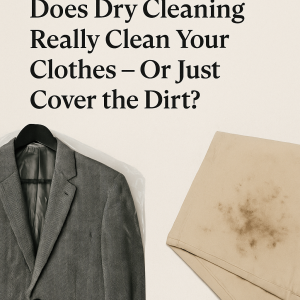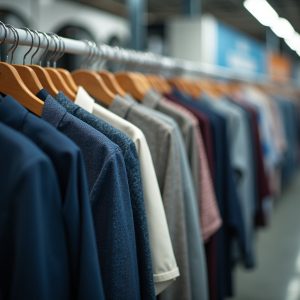Does Dry Cleaning Really Clean Your Clothes – Or Cover the Dirt?
When most people drop off their favourite suit, silk dress, or winter coat at the dry cleaner, they wonder: Is this really cleaning my clothes, or just making them smell nice? It’s a fair question. After all, you’re trusting expensive or sentimental garments to a process that sounds mysterious.
Does Dry Cleaning Really Clean Your Clothes? This is a common question among those who use dry cleaning services.
In this guide, we’ll break down what dry cleaning actually is, how it works, and whether it truly cleans or hides dirt. We’ll also clear up common myths, compare it to regular laundry, explain the science in simple terms, and share real-life examples from London that demonstrate its effectiveness.
To answer whether Dry Cleaning Really cleans your Clothes, we need to explore the cleaning process in detail.
Why the Name “Dry Cleaning” Is Confusing
Understanding the Question: Does Dry Cleaning Really Clean Your Clothes – Or Cover the Dirt?
The primary reason people are suspicious of dry cleaning is the name itself. Dry cleaning makes it sound like clothes are cleaned without liquid at all, maybe just brushed off or vacuumed. That’s not the case.
Dry cleaning uses liquid, but instead of water, it uses special cleaning solvents. For many years, a chemical called perchloroethylene, commonly referred to as “perc,” was the standard. Today, because of health and environmental concerns, many cleaners (including eco-friendly ones like Hampstead Garment Care) use safer, biodegradable solvents.
Does Dry Cleaning Really Clean Your Clothes – Or Cover the Dirt? is crucial for informed cleaning choices.
Many customers often ask, Does Dry Cleaning Really Clean Your Clothes? Understanding this can guide your choices.
So no, dry cleaning isn’t “dry.” And it’s not about spraying perfume on clothes. It’s a chemical process designed to dissolve oils, grease, stains, and smells at a deep level.
How Dry Cleaning Works – The Steps
 Here’s how professional dry cleaners clean your clothes:
Here’s how professional dry cleaners clean your clothes:
1. Inspection and Tagging
Each item is tagged and inspected for stains, fabric type, embellishments, and any delicate details. That way, cleaners know precisely what treatment it needs. For example, sequins or buttons may be covered for protection, and fragile stitching is noted to avoid stress in the machine.
2. Pre-Treating Stains
Special stain removers are applied before the wash. Red wine, oil, makeup, or ink all need different solutions. This step enhances the cleaning process. Professionals often use spotting boards, steam guns, or gentle brushing to lift stains before garments are even put into the machine.
3. The Cleaning Cycle
Garments are fed into a large machine that resembles a washing machine. Instead of water, it uses a solvent. The solvent dissolves oils and grease that water can’t. The machine moves the clothes gently while the solvent works. The cycle usually lasts 8–15 minutes, depending on the fabric, and is carefully programmed to prevent shrinking or fabric stress.
4. Filtering the Solvent
Modern machines constantly clean and recycle the solvent, so clothes are washed in a fresh solution, not dirty fluid. The solvent passes through carbon filters and distillation units, which means every wash is as effective as the first.
 5. Drying and Ventilation
5. Drying and Ventilation
After the cleaning cycle, the solvent is removed. Clothes are dried and ventilated inside the same machine, ensuring that no chemical residues remain on them. The drying phase also uses warm air circulation, which helps kill bacteria and eliminate lingering odours.
6. Finishing
Finally, items are pressed, steamed, and reshaped so they look crisp and ready to wear. Finishing may include hand ironing, delicate steaming for silk, or using special mannequins that blow hot air to restore coats and jackets to their proper shape. This last step is what gives garments that polished, just-bought appearance.
The Science in Simple Terms
So, Does Dry Cleaning Really Clean Your Clothes? Let’s break down the scientific approach.
- Laundry with water: Water helps dissolve stains caused by sweat, coffee, or juice. Soap helps the water penetrate the fabric and wash away dirt.
- Dry cleaning with solvent: Solvents don’t mix with water. They’re effective at dissolving oily stains, such as grease, makeup, wax, and body oils. These are stains that everyday laundry often can’t remove. The debate continues: Does Dry Cleaning Really Clean Your Clothes – Or Cover the Dirt? This is where understanding the mechanics can help. Delicate fabrics, such as wool, silk, or velvet, are not suitable for water. They shrink, stretch, or lose shape. But solvents clean them gently without damaging the fibres.
In short, dry cleaning removes the stains and oils that water can’t. It doesn’t just hide them.
In conclusion, the question remains: Does Dry Cleaning Really Clean Your Clothes? Yes, it does.
Common Myths About Dry Cleaning
Myth 1: It only makes clothes smell nice.
Truth: Solvents break down grease, dirt, and oils. The clean smell is just a bonus. In fact, many solvents are specially designed to dissolve body oils, sweat build-up, and food residue that water cannot touch. The fresh scent comes from the final drying and airing stage, not from spraying perfumes.
Myth 2: It ruins your clothes.
Truth: It’s often gentler than washing, especially for delicate fabrics. A machine at home can easily stretch or fade clothes. Dry cleaning machines are carefully programmed to reduce stress on fibres, and the lack of water helps keep fabrics from shrinking or distorting. Many garments actually last longer with regular dry cleaning.
For those in doubt, they may ask, Does Dry Cleaning Really Clean Your Clothes – Or Cover the Dirt? This is a pivotal question.
The pivotal question: Does Dry Cleaning Really Clean Your Clothes? It’s essential to understand.
Myth 3: It leaves dangerous chemicals on clothes.
Truth: Modern solvents are safe, biodegradable, and leave no residue. Old-style solvents, such as perchloroethylene, gave dry cleaning a bad reputation, but most quality cleaners now use environmentally friendly alternatives that are both effective and safe for skin contact.
Many people still wonder, Does Dry Cleaning Really Clean Your Clothes? Here’s the truth behind it.
Myth 4: Only fancy clothes need dry cleaning.
Truth: Everyday clothes, uniforms, coats, and even curtains often need it when they pick up oils, sweat, and city pollution. For example, wool coats trap car fumes and dust, and uniforms gather grease and bacteria — both require solvent cleaning to restore freshness.
Myth 5: All dry cleaners are the same.
Truth: Quality varies. An expert cleaner who takes time to inspect and treat clothes does a far better job than a cheap one rushing through. Experienced professionals also know which solvents, spotting agents, and finishing techniques to use for specific fabrics, resulting in far better outcomes and protecting your wardrobe investment.
Real Example: Red Wine on a Silk Dress in Mayfair
A client in Mayfair once brought us a silk evening dress worn to a dinner party. A splash of red wine had landed right on the front. She tried blotting it with a tissue, but avoided internet tricks like salt or soda water.
When she brought it to us, the stain was already starting to set in. Washing it at home could have caused permanent watermarks or colour bleeding.
We used a stain remover for wine (a “tannin” stain), then ran the dress through our eco-friendly dry cleaning machine. After steaming and reshaping, the dress looked brand new — no wine marks, no fading, no damage.
She later wore it to another event and said no one could tell anything had happened.
This shows how dry cleaning doesn’t just cover stains — it removes them completely.
Ultimately, the key is to ask: Does Dry Cleaning Really Clean Your Clothes? Knowing this helps you choose wisely.
Another Example: Grease-Stained Chef Uniforms
This example illustrates why dry cleaning really does clean your clothes. It shows the effectiveness in practice.
A London chef brought us his uniforms after weeks of cooking had left them covered in oil and grease. Regular washing had left them grey and dingy.
We pre-treated the stains and ran them through solvent cleaning. The uniforms came out bright white and hygienic, with no lingering odour.
This wasn’t cosmetic — it was a real clean.
Dry Cleaning vs. Laundry
Here’s a simple comparison:
When assessing options, one might wonder, ‘Does Dry Cleaning Really Clean Your Clothes?’ It is a valid consideration.
For those asking, Does Dry Cleaning Really Clean Your Clothes? The facts are compelling. People often question, Does Dry Cleaning Really Clean Your Clothes? Research supports its effectiveness. When evaluating options, remember to consider: Does Dry Cleaning Really Clean Your Clothes? It’s crucial for decision-making. For many, the question is straightforward: Does Dry Cleaning Really Clean Your Clothes? The answer is a resounding yes.
| Aspect | Laundry (Water) | Dry Cleaning (Solvent) |
|---|---|---|
| Best For | Every day cottons, linens | Suits, silk, wool, delicate fabrics |
| Stains Removed | Sweat, juice, mud | Grease, makeup, oil, tar |
| Fabric Effect | Can shrink or fade | Gentle, keeps shape |
| Odour Removal | Good | Excellent |
| Environment | Uses lots of water and detergents | Uses eco-friendly solvents |
| Finish | Needs ironing | Professionally pressed and shaped |
| Longevity | Clothes may wear faster due to frequent washing | Garments last longer when fibres are protected |
| Convenience | It can be done at home, but it’s time-consuming | Professional pickup, delivery, and pressing included |
| Cost | Low ongoing cost at home | Higher per-item cost, but saves on replacements |
Both have their place, but for delicate fabrics and oily stains, dry cleaning is the clear winner. Plus, when you factor in garment longevity and convenience, professional dry cleaning can actually save money in the long run by reducing the need to replace worn-out clothes.
In summary, we should ask, Does Dry Cleaning Really Clean Your Clothes? It’s a vital inquiry.
When You Should Dry Clean
Some clothes must be dry cleaned, such as:
-
- Suits and blazers (water ruins the inner structure and causes them to lose shape)
Moreover, when deciding, consider: Does Dry Cleaning Really Clean Your Clothes? This will inform your choices.
- Silk and satin dresses (easily stained by water and prone to colour bleeding)
- Wool coats (can shrink or felt in water)
- Evening gowns with beads, sequins, lace, or embroidery (delicate details require extra protection)
- Leather and suede (need solvents and conditioning to prevent cracking)
- Work uniforms with heavy oil or grease (like chefs, mechanics, or factory workers)
- Household items like curtains, rugs, or duvets (trap dust, allergens, and city pollution over time)
- Speciality fabrics like velvet, cashmere, or mohair (water can flatten fibres or cause permanent distortion)
- Vintage or heirloom garments (fragile textiles need the gentlest possible care)
- Seasonal outerwear, such as down jackets or parkas (require careful cleaning to maintain insulation)
If you’re unsure, it’s always safer to take garments to a professional cleaner for advice — especially if the label says “Dry Clean Only.”
The Hygiene Advantage
Dry cleaning doesn’t just make clothes look nice — it sanitises them. The solvent and high drying temperatures kill bacteria and neutralise odours. This is especially useful for people with allergies, as dry cleaning removes dust mites, pollen, and bacteria that accumulate in fabrics.
Consider the implications: Does Dry Cleaning Really Clean Your Clothes? It’s more than just aesthetics.
Dry Cleaning and the Environment
 Older cleaning chemicals weren’t environmentally friendly, but many cleaners today have been upgraded. Modern practices include:
Older cleaning chemicals weren’t environmentally friendly, but many cleaners today have been upgraded. Modern practices include:
-
- Safe, biodegradable solvents
- Machines that recycle and clean solvents automatically
- Energy-efficient equipment
- Recyclable packaging
- Reduced water consumption compared to traditional laundry
- Closed-loop systems that prevent solvent emissions into the environment, Responsible waste management, ensuring filters and residues are disposed of safely
Lastly, never forget to reflect on: Does Dry Cleaning Really Clean Your Clothes? It’s essential for sustainability.
This makes professional cleaning a sustainable choice. It also extends the life of clothes, reducing waste compared to discarding them and purchasing new ones. In fact, studies show that extending a garment’s life by just nine months can reduce its carbon footprint by 20–30%. By using eco-friendly dry cleaning, customers not only protect their wardrobes but also contribute to a more sustainable and lower-impact lifestyle. For city dwellers, where pollution and fast fashion prevail, choosing sustainable garment care is a small yet powerful step toward a greener future.
Why People Still Doubt Dry Cleaning
Some people still doubt the effectiveness of dry cleaning. Usually it’s because:
It’s common to ask: Does Dry Cleaning Really Clean Your Clothes? Understanding this clears up confusion.
- They used a cheap cleaner that skipped steps.
- They expected impossible results — some stains (like bleach marks) can’t be undone.
- They don’t see the process, since it happens inside machines, not in soapy water like at home.
- They misunderstand what dry cleaning can and can’t do — for example, thinking it can restore colour that has faded or reverse fabric wear.
- They compare it unfairly with home washing, expecting the same bubbly, visible action, even though solvents work differently.
The solution? Choose a professional cleaner who clearly explains the process, educates customers on what is and isn’t possible, and demonstrates real results with examples and before-and-after cases.
Final Verdict: Does Dry Cleaning Work?
Yes — without question.
Dry cleaning doesn’t just mask dirt; it removes it. It removes grease, oil, and stains that water can’t touch. Done correctly, it keeps clothes clean, fresh, and long-lasting. It also helps maintain the structure and colour of delicate garments, making them last longer and look better. Unlike basic laundry, which can wear out fibres, dry cleaning is designed to protect them.
Think of the silk dress in Mayfair or the chef’s uniforms — both restored by dry cleaning when laundry would have failed. You can also picture a wool coat holding its shape through years of winters, or a vintage garment preserved for the next generation — these are all possible because dry cleaning goes beyond surface cleaning and truly preserves what matters.
Ultimately, consider this: Does Dry Cleaning Really Clean Your Clothes? It’s essential for garment care.
Quick Tips for Customers
- Always check the label. If it says “Dry Clean Only,” follow it.
- Avoid using risky home remedies on delicate fabrics.
- Inform your cleaner about the cause of the stain. Details help.
- Choose an eco-friendly cleaner that effectively cleans garments.
- Don’t wait too long. The longer a stain sits, the more difficult it becomes to remove.
- Use cleaners designed for seasonal storage to protect items such as coats and gowns.
- Ask about additional services, such as moth-proofing, waterproofing, or fabric protection sprays.
- Store freshly cleaned clothes in breathable garment bags instead of plastic to avoid moisture build-up.
- Rotate your wardrobe regularly — letting stains or oils sit for months makes them harder to remove.
- Build a relationship with your cleaner; the more they know about your preferences, the better care they can provide.
Conclusion
Dry cleaning is not a cover-up — it’s real cleaning. It utilises science to tackle stains and dirt that traditional laundry methods can’t handle. From delicate silks to sturdy uniforms, dry cleaning makes clothes cleaner, safer, and longer-lasting. Remember, Does Dry Cleaning Really Clean Your Clothes – Or Cover the Dirt? It is a valid and essential question.
In conclusion, always remember the question: Does Dry Cleaning Really Clean Your Clothes? It’s significant.
At Hampstead Garment Care, we’ve spent over 20 years perfecting this process. We don’t just freshen clothes. We bring them back to life.
So if you’ve ever wondered, “Does dry cleaning really clean my clothes?” the answer is yes — and much more.
If ever in doubt, reflect on: Does Dry Cleaning Really Clean Your Clothes? This guarantees clarity.




No comment